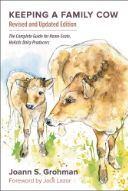Post by 3cows on Dec 26, 2015 11:39:12 GMT -5
In researching for an article I was writing this week, I happened upon this information and thought I would share it, since I am sure I am not the only knee-deep in seed catalogs and garden diagrams.
Picloram, Clopyralid or Aminopyralid herbicides, sold under the trade names of:
Tordon, Access, Surmount, Grazon, Pathway, Curtail, Confront, Clopyr AG, Lontrel, Stinger, Millennium Ultra, Millenium Ultra Plus, Reclaim, Redeem, Transline, Milestone, Forefront, Pharaoh, and Banish
are easily absorbed by some types of common vegetable plants, such as lettuce, beans, peas, spinach, tomatoes and potatoes and can cause them to grow in a twisted manner, with malformed leaves, often appearing cupped. Production is poor, but supposedly safe to eat.
This problem is showing up in gardens where hay that was treated with these herbicides is used for compost, and since it passes through the grazing animal, even composted manure from animals who eat the hay or pasture on land treated with these can be deadly to your garden. Some of the information even suggested it could be present in commercial compost and manures bought by the bag.
This may be old news to many of you, but it made me sit up and take notice - and ask questions of my hay grower. I depend on my garden for much of my food each year and, especially in iffy times like these, I don't want to ruin my soil and be forced to buy commercially grown food.
If anyone has experience with this or more info to add, I would very much appreciate it.
www.the-compost-gardener.com/picloram.html
www.motherearthnews.com/organic-gardening/pest-control/herbicide-damage-zmgz13fmzsto.aspx
content.ces.ncsu.edu/herbicide-carryover
compostingcouncil.org/wp/wp-content/uploads/2012/07/Herbicide-Carryover.pdf
ipm.missouri.edu/MEG/2014/8/Contaminated-Compost-Equals-Gardening-Problems/
Picloram, Clopyralid or Aminopyralid herbicides, sold under the trade names of:
Tordon, Access, Surmount, Grazon, Pathway, Curtail, Confront, Clopyr AG, Lontrel, Stinger, Millennium Ultra, Millenium Ultra Plus, Reclaim, Redeem, Transline, Milestone, Forefront, Pharaoh, and Banish
are easily absorbed by some types of common vegetable plants, such as lettuce, beans, peas, spinach, tomatoes and potatoes and can cause them to grow in a twisted manner, with malformed leaves, often appearing cupped. Production is poor, but supposedly safe to eat.
This problem is showing up in gardens where hay that was treated with these herbicides is used for compost, and since it passes through the grazing animal, even composted manure from animals who eat the hay or pasture on land treated with these can be deadly to your garden. Some of the information even suggested it could be present in commercial compost and manures bought by the bag.
This may be old news to many of you, but it made me sit up and take notice - and ask questions of my hay grower. I depend on my garden for much of my food each year and, especially in iffy times like these, I don't want to ruin my soil and be forced to buy commercially grown food.
If anyone has experience with this or more info to add, I would very much appreciate it.
www.the-compost-gardener.com/picloram.html
www.motherearthnews.com/organic-gardening/pest-control/herbicide-damage-zmgz13fmzsto.aspx
content.ces.ncsu.edu/herbicide-carryover
compostingcouncil.org/wp/wp-content/uploads/2012/07/Herbicide-Carryover.pdf
ipm.missouri.edu/MEG/2014/8/Contaminated-Compost-Equals-Gardening-Problems/







